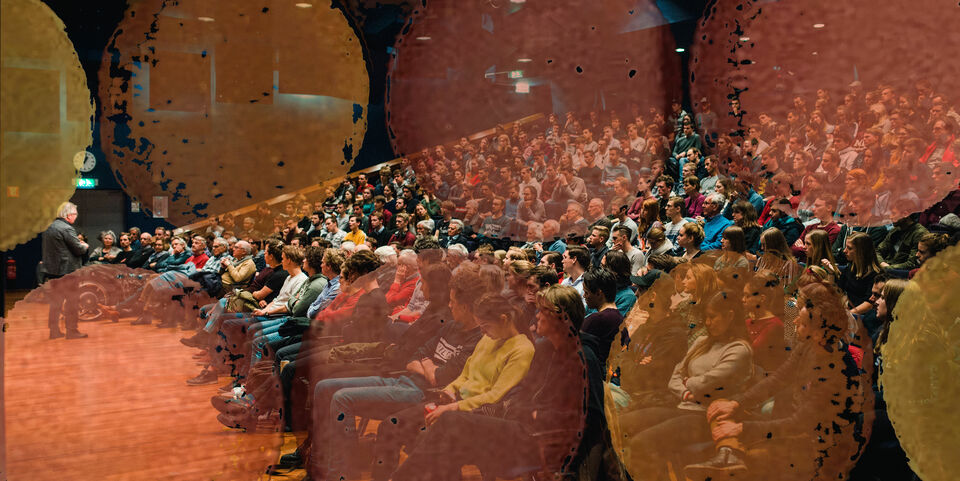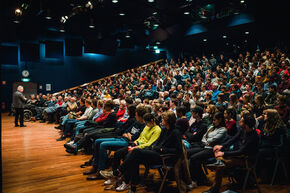Drug nation The Netherlands: ‘What a small country can be great at’
The Netherlands is a top player when it comes to drugs. Unfortunately, this dubious honor is also associated with violence and crime. We are not only the largest manufacturer of synthetic drugs such as ecstasy, but also the most important transhipment point in the trade of these drugs. Studium Generale held a lecture yesterday afternoon, given by Pieter Tops, professor of Public Administration at the University of Tilburg and associated with the Police Academy.
Tops has been researching undermining crime in the Netherlands for years. He published, in collaboration with several other researchers, the report 'What a small country can be great at'. Marle de Jonge of Studium Generale described it beautifully in the announcement as 'a small Breaking Bad in the polder'. "It is a problem throughout the Netherlands, but the provinces of Brabant and Limburg seem to be even more popular," said Tops.
Chemistry students wanted
Chemistry is the basis for the creation of synthetic drugs and we have lab facilities at the TU/e that many drug criminals dream of. De Gelderlander (Dutch newspaper) recently published an article stating that chemistry students are massively recruited to make drugs in ecstasy labs. There even seem to be criminals who register for such courses in order to get in touch with the students more easily. According to Tops, these rumors are not logical: "Everyone can make synthetic drugs. The recipes are easily found online on the darkweb. The difference between an amateur and a real laboratory technician is that the latter gets more results from the same raw materials. But the production costs are so low, that is really not worth the effort."
The question was also posed in the hall: are there any chemistry students who have been approached to abuse their knowledge? It remained silent; no such students were present in the Blauwe Zaal. Or at least they did not dare to speak up about this.
Lucrative business
There is an estimated 19 billion euros in the trade of synthetic drugs. Much of the earned money eventually goes into the legitimate world. Sometimes via no longer traceable funds or brokering, sometimes directly. Think of the latter at places where you can pay with cash, like (expensive) restaurants or clubs. But also in the retail trade people often pay with money of which the origin is dubious. In this way, ordinary entrepreneurs are also partly dependent on the drug trade as the criminal underworld and legitimate world mix. There are roughly three reasons why the Netherlands is so attractive as a drug nation:
1: The gateway: we are the gateway to Europe with, among other things, the port of Rotterdam
2: Excellent infrastructure
3: Low chance of being caught and low punishments
The proper infrastructure does not only concern our smooth asphalt. The digital network also offers opportunities. The darkweb functions as an excellent marketplace for the purchase of raw materials, as well as the possibility of distribution and sale of illegal drugs. If you’re caught, the punishments are low in the Netherlands, compared with the countries around us. Therefore it remains attractive to keep the production here.
Because we think it is important in the Netherlands to hinder economic traffic as little as possible, parcel post is a beloved distribution way for drug criminals. Packages are barely checked and for letters there is also the concept of ‘letter secret’. "Australia started a hundred percent check on parcel post from the Netherlands. But a proper criminal now simply sends his drugs from Germany or Belgium," Tops knows.
Fighting it or legalizing it?
Is legalization a solution? Tops does not think so. At least, not for now. "First, the illegal drugs business must be further reduced, otherwise the legal business would have no chance. And if only the Netherlands would legalize, it would not be enough. You have to start partnerships in Europe with other countries to stand together. If the Dutch police are trying to catch a criminal around the border area and he moves to Belgium, the Dutch police cannot just arrest him. To do so, a request for legal assistance must first be submitted. For the criminal, the border is an opportunity, for the authorities it’s just a threshold.” And that's how the cat-and-mouse game will exist for a while.




Discussion